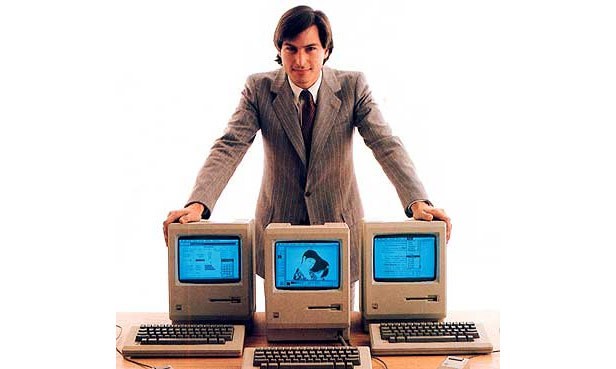We’ve heard some wonderful stories from people who were lucky enough to have met Steve Jobs, all of which describe Steve as a remarkable man who was, amongst other things, determined, driven, and passionate. Steve knew what he wanted, and he was committed to making it happen, and to photographers who worked with him, that made him a very challenging photo subject.
Steve wanted just as much control over the pictures taken of him than he did over the exemplary products his team was creating at Apple. He wasn’t prepared to let anyone take pictures of him, anywhere — it had to be just so. PDNPulse, a professional photography blog, has a few humorous stories from professional photographers who had the pleasure of dealing with the difficult Steve.
William Mercer McLeod, a San Francisco photographer who worked with Steve five times, said:
“It was the joke among photographers. He was like the nightmare subject.”
“It was in the late 80s. [Jobs] walked into the the photo shoot and started moving the lights around. Then he picked up the phone and called the art director in New York and said he wanted to do something different.”
“He’s the only person I ever saw do that.”
Photojournalist Ed Kashi, who worked with Steve around ten times during the early 80s and early 90s, said that Ross Perot told Steve to “grow up” during one shoot:
“He was one of the most difficult subjects I ever dealt with during my Silicon Valley years but I appreciated his awareness of identity, setting and message of the images. There was one time I had to get a picture with him and Ross Perot and when Jobs acted up Perot turned to him and like a stern parent said ‘Steve, Grow up!!’ No matter how dreadful he could be as a subject, I am deeply saddened by his early departure.”
Doug Menuez worked with Steve more than any of the other photographers, with access to the NeXT boardroom for three years while Steve was at the helm.
“In all those years, Steve only screamed at me at the top of his lungs once,” Menuez recalls. It was in 1988, when Fortune hired Menuez to shoot a portrait of Jobs for the cover of the magazine. Menuez wanted to photograph him in the NeXT offices, on a staircase that Jobs had commissioned architect I.M Pei to design. Jobs arrived for the shoot, looked at what Menuez had in mind, “then [he] leaned in and says, ‘This is the stupidest fucking idea that I’ve ever seen.’ Right in my face, like 5 or 6 inches away,” Menuez says. “I felt like I was 10 years old. He went off on a tirade. He said, ‘You just want to sell magazines. ‘And I said, ‘And you want to sell computers.’ And at that he said, ‘OK,’ and sat down.
“I’ve been in war zones, but I like to say that I became a man learning how to stand my ground with Steve.”
Be sure to read the PDNPulse report for more stories from photographers who worked with Steve — it’s a fascinating read, and I’m sure you’ll enjoy it.



8 responses to “Steve Jobs’s Obsession With Perfection Made Him A ‘Nightmare Subject’ for Photographers”
“I’ve been in war zones, but I like to say that I became a man learning how to stand my ground with Steve.”
Fascinating perspective. I think people probably either grew a pair of stones around Steve, became sycophants, or just bailed. And Steve most likely didn’t buy into sycophancy much, now that I think about it.
Steve’s mantra: Grow up or leave. Choose now.
Its great to see a surge in never before told stories, very, very interesting. I’m sort of getting interested in Steve’s NeXT era, I’d love to know all about that, what he did, the company, I think its very interesting and obviously, NeXT IS Mac OS X/iOS so its a very important era.
I don’t remember where I got (read) this, but trust me, it’s true… when Apple hired a photographer to shoot the first cover for MacWorld Magazine (the one that illustrates this article BTW), Steve insulted the photographer right off the bat and dead on arrival by saying, and I quote: “Are you one of those shitty photographers that takes a dozen shots hoping to get a good picture?”
Gosh, if I could remember where I got this…
The nuanced reality that was omitted from my story is the way Steve was able to choose correctly from what was presented to him, be it a proposed hardware component or a magazine cover idea – it was about trust. He had to know the person completely believed in their idea, had thoroughly done their homework before presenting, and was willing to put their career on the line for their recommendation. Yes, his aggressive challenge to ideas he did not immediately agree with may appear tough, but so does boot camp for Marines. It’s about excellence. To succeed at the level Steve was aiming at, and achieved, is of course insanely difficult. The people working for him understood the stakes and the method, although sometimes hard on people, worked well for Steve to get to the true value of things. And everyone around him was pushed to deliver above their talents. He raised the game for us all. In my case, once he understood I had a clear vision for the photograph and knew what I wanted and was not backing down, he trusted my idea and it went on to be a bestselling cover of Fortune that year.